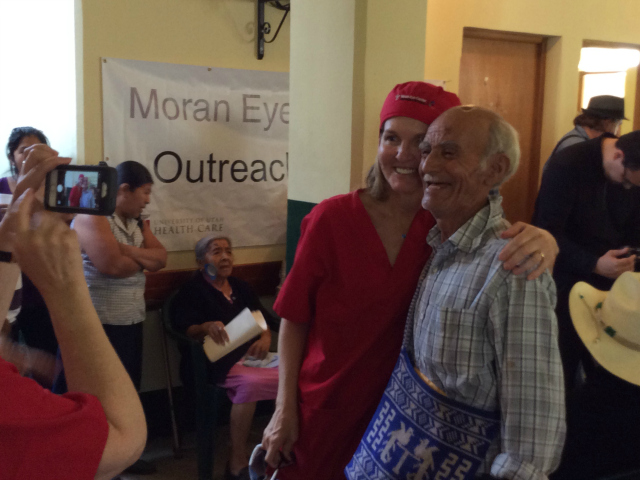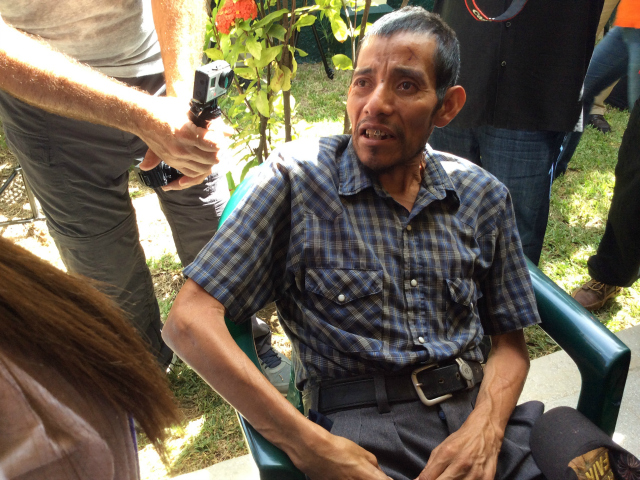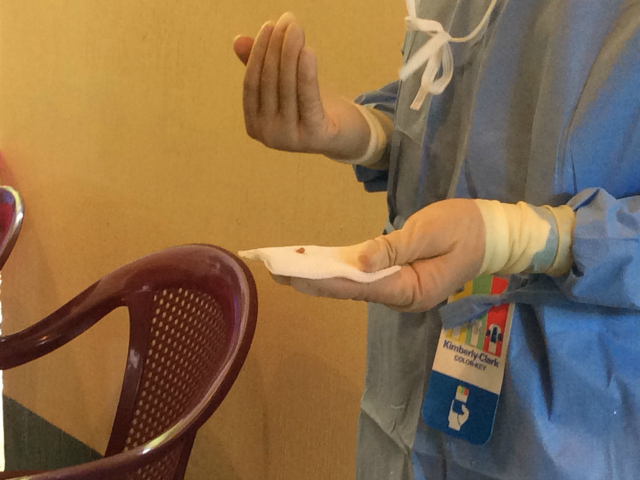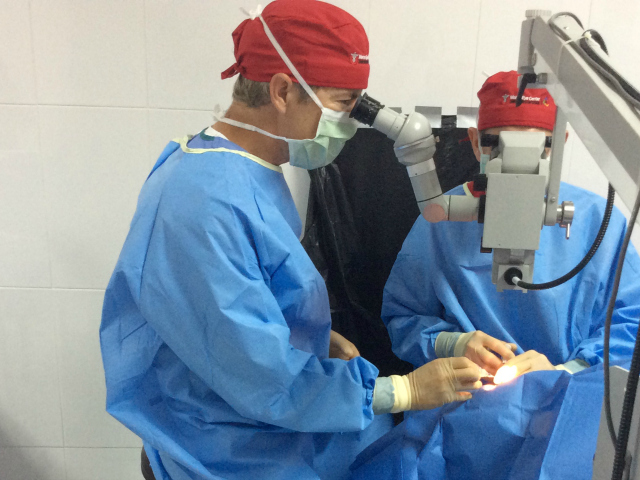
SALAMA, Guatemala –“It’s a lot different in the sense that here we see a problem and fix it,” Sen. Rand Paul (R-KY) told Breitbart News in an interview outside the makeshift operating room at an ophthalmologic clinic in the remote Guatemalan town of Salama.
He isn’t comparing Washington, D.C., to Guatemala. He’s contrasting the two separate professions in which he works: politics and medicine.
“In D.C., we see a problem and then we spend endless time debating it and we don’t fix it. It’s disappointing,” said Paul, an ophthalmologist for years before getting elected to the U.S. Senate in 2010. Being able to fix problems quickly as an ophthalmologic surgeon, Paul said, is refreshing. “Almost everybody here will probably see better,” Paul said. “Some might take up to a week to react to the surgery, but almost everyone will get better.”
Paul and a team of other doctors from the John A. Moran Eye Center at the University of Utah conducted over 100 surgeries over three days here in Salama, Guatemala, removing cataracts from people’s eyes and replacing them with plastic lenses. While Paul is now back out of the country, the mission here will continue through Friday, and upwards of 250 cataract surgeries will be done. While this is a basic surgical procedure in the United States, Guatemalans have little access to medical care because a dearth of doctors, medical supplies, and necessary facilities plagues the third-world nation. Here in Salama, the procedure is out of reach for most.
All those people and hundreds more lined up outside the Hospital De Ojos Club De Leones Internationale, or the Lions Club International’s Eye Hospital, here in Salama to see Dr. Paul and the team of doctors from the Moran Center–led by Dr. Alan Crandall and including Drs. Jeff Pettey, Roger Furlong, Susan MacDonald, and David Chang.
Before he left for Guatemala, Paul conducted several charity ophthalmologic surgeries on Kentuckians in Bowling Green. Paul’s been doing pro bono surgery work for decades. Fifteen years ago, he performed surgery on two Guatemalan boys, Juan and Andres Hernandez, for cataracts and other eye issues that caused them both to be blind as children. Now, both are full-grown men–and they can still see thanks to the operation Paul did for them when they were flown into Bowling Green a decade and a half ago.
“I’m seeing a little bit more,” the soft-spoken Andres Hernandez said in a brief interview through a translator, one of fourteen young, female translators who volunteered to help the mission by taking time away from their studies at San Carlos University in Guatemala City.
Before surgery, Andres Hernandez said, “no,” he couldn’t see at all. “Dr. Pablo,” as he and his brother call Paul, “helped me a lot.”
The boys, from Jalapa, Guatemala, needed to hold each others’ hands and count the number of steps to the local water source in their village to fill up a bucket of water for their family–then count the steps back together with full buckets so their family could have water when they were children.
“I can walk alone now,” Andres, who like his brother is now a full-grown man, said. He said he’s kept in touch with Dr. Pablo for the last 15 years, but this is the first he’s seen him in person since. “He’s good,” Andres said, when asked about his relationship with Paul.
“Most of the time,” Paul said in his first interview with Breitbart News, the little plastic lens that doctors insert into a patient’s eye in place of the removed cataract is good enough for the rest of these peoples’ lives. “It sometimes gets a little bit of scar tissue behind it after a year or two, so we take a laser and polish up to get rid of the scar tissue.”
Because of the concern of scar tissue building up behind the incisions, when the Hernandez boys and others were brought to Bowling Green, Paul said “we kept them there for about two or three weeks to let them heal, then I did a laser because I wasn’t sure if I’d see them again–they live in a remote village with no running water and a dirt floor.”
“They now have ambulatory vision–they can’t see well enough to read a book or drive a car, but they can walk around their village now,” Paul added. “I wish we could do more. They’re [the Hernandez boys] excited to come here thinking they’ll get more vision, so we’ll see what we can do–but at least now they can see enough to get around their village.”
Paul was first reunited with the Hernandez brothers at the local hospital in Salama, across town from the Lions Club International’s eye hospital. He met them for the first time in 15 years inside an examination, after Paul conducted a basic physical on a young boy named Calvin who had two clubbed feet. The boy cried in pain–a clubbed foot is painful to walk on–while his mother held him and Paul checked his lungs and heart, and other basic checkups as part of a physical before sending Calvin to another room for a hernia exam. Paul was conducting because if Calvin was deemed well enough, Paul’s longtime friend, Kentucky-based immigration attorney Judy Schwank–who played a major role in helping with the logistics of this mission–said he would be flown to the U.S. for treatment for the clubbed feet. It is expected Calvin will be brought to America soon, since the physical found he was ready for treatment.
When Calvin was taken out of the room and the Hernandez brothers were brought in alongside their mother, Paul shined a flashlight in both of their eyes to check on his work from 15 years ago. Both boys could see as much as they could when Paul operated on them over a decade before he even began his political career–still not perfectly, but enough to get by in daily life in Jalapa–but Paul wanted to get both checked for glasses to see if eyewear would help them even more.
Around the corner from this hospital a few blocks away through Salama’s stone roads was the Club De Leones Internationale center, or Lions Club International center, a building that inside looks like a recreational facility or high school gymnasium, sans basketball hoops or any other sporting equipment for that matter. Inside, the Hope Alliance–another Utah-based nonprofit that ventured as a partner group with the Moran center and the American Society of Cataract and Refractive Surgery Foundation (ASCRS) to Salama alongside Paul and his team–was giving out free pairs of glasses to those who need them in the Guatemalan town.
Hope Alliance board chairman Glenn Artist, in an interview with Breitbart News Wednesday morning, said people register in the morning and would be fitted for a prescription using a retina max machine that looks into their eyes to find the prescription they need. Then, from suitcases full of marked, tagged, bagged, and internal database-categorized pairs of glasses donated to various Lions Clubs, Rotary Clubs, and given to the organization from various lost and found boxes from across Utah specifically and the United States, the Guatemalans are able to select a pair from a group of glasses that match or are close to their prescription that they like best. “Just like if you go to the optometrist, the retina max gives you the prescription,” Artist said while providing a tour of the operation.
If any person needs more help than just a prescription, there are two optometrists on site who can diagnose many problems–especially cataracts, for which glasses won’t help. The people with those will likely need surgery across town, assuming there’re no other major issues with their eyes that surgery won’t help. “We’ve got rudimentary equipment for rudimentary diagnoses,” Dr. Lynn Stromness of Utah told Breitbart News. They’re able to detect cataracts “quite easily,” Stromness said. “Then there are sometimes prescriptions for which the machines don’t work on certain people so we have to find their prescription manually–with, instead of the big machine you sit behind back home with these loose lenses,” he said, while holding up what looked like a classroom ruler with various size glass-filled lenses lining each side.
That group–where Dr. Paul wanted to send the Hernandez boys to see if they could get some spectacles to help them more–had been over capacity for days straight when I interviewed Artist and executive director Melissa Caffey. For instance, on Wednesday morning, the Hope Alliance was handing out numbers to the hundreds of people seeking glasses to help them see for an appointment more than a day later–and many had traveled hours, even full days, to get to Salama from other more remote parts of Guatemala.
Dr. Furlong, in an interview between operations, told Breitbart News the severity of the cataracts and other eye conditions in these Guatemalans are far worse and widespread here than anywhere in the United States, even though some in the U.S. reach this level if they don’t get treatment fast enough.
“Most of these people are functionally blind in one or both eyes, so this will change their life entirely,” Furlong said.
“Tomorrow, they’ll be able to see again,” Furlong added. “Their vision will get even better in two or three days, but most of these people’s cataracts are so bad that even by tomorrow they’ll be much better. But in two to four days, they’ll continue to see improvements.”
“We did 20 cases by lunch and probably another 10 since,” Paul said in this first interview of many over the course of the week with Breitbart News on Monday, the first day of surgeries, “all cataracts.”
The first to receive surgery was the president of the Lions Club International in Salama, the small town’s former mayor, Luis Eduardo Ascenio, who told Breitbart News in a brief interview outside the facility wearing a medical eyepatch that he went first so the hundreds of Guatemalans who would seek help from the American doctors would have trust in the medical professionals.
“There is people who doesn’t trust the staff or the doctor, so what happened was they requested me to do this activity first so I decided to be the first so I would prove to all the town that all the doctors inside there are truthful,” Ascenio said in the interview, according to a translator.
The next day, as Ascenio had his bandage taken off, he told Breitbart News he could “see a lot better” in the eye from which he had his cataract removed, “a lot better than the other eye.”
“Yes, way better,” Ascenio said. “It is actually very important because it is helping the community here in Salama, and one of these surgeries would be around 12,000 or 15,000 quetzales [the local currency, an amount that’s between $1,500 and $2,000 in U.S. currency]. I’m actually very grateful for the surgeries; thank you for coming from all of Salama, and all of Guatemala as well.”
Bernardo Reyes Reyyes, an 84-year-old peanut, corn, and soy farmer who was blind in his left eye but now can see thanks to the operation he got, told Breitbart News that he is “thanking God for this life that he has given to me.” Reyyes came to Salama from Cuilco, Guatemala, for the surgery–around an eight-hour drive on the pothole-filled roads outside the capital Guatemala City.

“I am praying for God to give me more life with this new sight that I now have,” Reyyes said. Reyyes had a decade ago received a surgery on his right eye so he could see out of that eye. Now he can see out of both. “Yes, of course!” he shouted, smiling at and hugging anyone he could, including me. “It’s clear! Magnificent! Thank you! Thank you! How much do I owe you for what you did for me?”
“The only thing I want to say is thank you so much for everything and for all of the love you have for this department and this township,” the man, like so many others a devout Catholic, then said, as if speaking directly to God about heaven. “May God bless you. Someday I hope I can get there.”
Another man, Efrian de la Cruz, was 100 percent blind in both eyes when he came into the clinic from over an hour–40 kilometers–away. “I’m going to church,” he told reporters through a translator, when asked what he’s going to do now that he can see again after a cataract was removed in one eye. “To kneel down, to beg for forgiveness from God. Thank God because you helped me and helped people who really needs it.”

De la Cruz was a local truck driver before he lost his vision. Now unhealthily skinny, his driver’s license picture showed the normal weight he had when he could work and drive. His wife and entire family left him when he went completely blind three years and two months ago, and he pulled out from his wallet a picture of her to show the reporters, doctors, and medical staff present. He’s always carried the photograph, although he hadn’t seen her face in three years until Tuesday. He began crying when he saw her picture.
“That’s him from three years ago,” Paul said to the group watching as he held up a photograph of de la Cruz from his driver’s license. “He’s lost a lot of weight because it’s tough to eat.”
De la Cruz’s surgery, which was done by Dr. David Chang–the international committee chair of the ASCRS Foundation–was one of the most complicated the doctors had to do that week.
“It’s probably been there for more than a decade,” Chang said on Monday when he pulled de la Cruz’s cataract out. “It’s sort of brownish, black–before you go completely blind, everything is looking a kind of a beige and then gold and then brown and then it just fogs over and you can’t see anything. This is the kind of cataract you don’t see anything like it in the United States. It’s maybe less than one percent of the cataracts we do will be this dense because patients won’t let it go until it gets that dense. But here, it’s been 90 percent of the cataracts have been like that. It’s the reverse. Instead of less than one percent it’s more 90 percent here, and it’s because these patients haven’t had access to surgery for so long.”

Now on Tuesday, de la Cruz can see the world again–even though some parts of his life remain shattered.
“My family left, my wife left,” de la Cruz said of his wife of 17 years.
This kind of case–and the hundreds of others who were helped this week in Salama–is the exact reason why Paul came to Guatemala to do this type of surgery.
“Cataracts are the most common ailment of the eye–and they’re age-related and sun-related,” Paul said. “The older you get and the more sun you get–anybody who’s old down here has accumulated a lot of sun over time. We have a lot of cataracts in our country, and a lot here because of the sun–but here, they don’t have many doctors. There’s just 2 for every 800,000 people. Two for every 800,000 people is not very many doctors–so they just gradually lose their vision. Probably half of them can’t see the Big E–and some of them don’t see a hand moving or have light perception, so they’re essentially blind.”
When asked what he’ll do with the rest of his life now that he can see again, de la Cruz said he’ll “worship Christ and help people who really [need] it.”
“I came here scared, thinking I wouldn’t get surgery because of my diagnosis,” he added. “I asked God for a lot of strength. When I came into the surgery room, I asked God for him to be able to assist me and have our doctors proceed with success. One day I said there’s no way I’d ever see again, but for God there’s nothing impossible. Today, I’m a new man. I am reborn. I came out of darkness to the light and see the beautiful, the pretty and see everything the light–the light bulb–everything. I thought I would never see the sky again with those white clouds.”

COMMENTS
Please let us know if you're having issues with commenting.